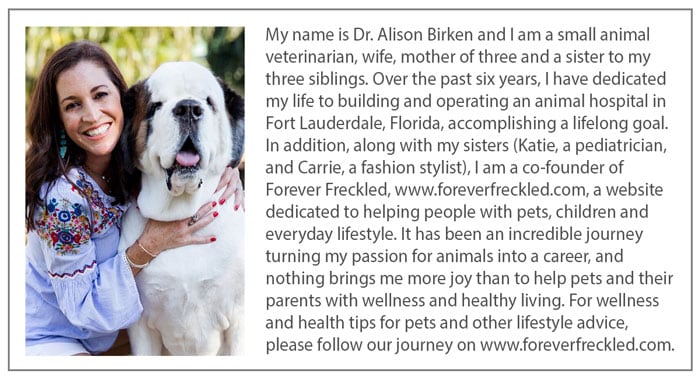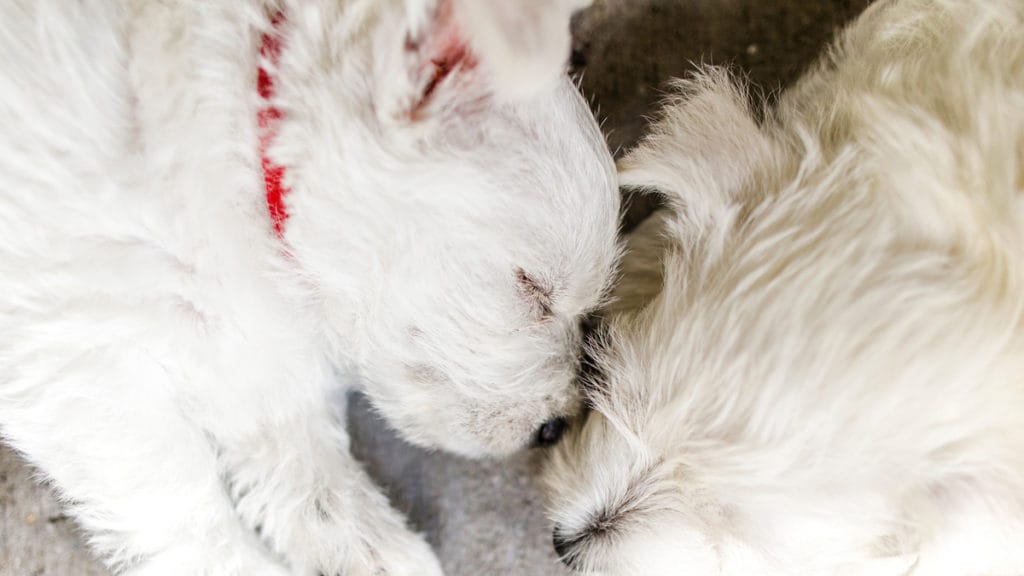Contributed by Dr. Alison Birken, owner and DVM of Victoria Park Animal Hospital.
Nothing is cuter or sweeter than a litter of puppies. When a client comes in with a litter of puppies for me to evaluate, suddenly the entire animal hospital is taking tons of pictures and squeezing and hugging them. To be totally honest, puppies and kittens are a big reason why I pursued a career in veterinary medicine. I just love their adorable, innocent little faces. As much as it is fun to play with a litter of puppies, caring for a litter of puppies is a major endeavor.
As a pet parent, you can create the ideal environment for a new litter of puppies to ensure their proper growth and development. Follow these tips for keeping your new puppies healthy, and learn how to pick up on signs of sickness, as well as what should be done if certain symptoms are visible.
Create a Den
A den is an area where the mother pup can feel safe and protected while caring for her offspring. Many times, the mother will start nesting, or bringing blankets, pillows and clothes from around the house to her den area in preparation for giving birth. I always advise my pet parents to have a set of blankets and pillows that are designated for the den that can be easily cleaned and changed out. To make sure no messy accidents make their way onto your blankets, pillows or carpets, I suggest putting Wee Wee Pet Training and Puppy Pads into the den to allow for easy cleanup. It is also important to keep the den clean, dry and away from sounds, people and bright lights.
Keep Them With Their Mothers
It is vital to keep the puppies with their mother when they are first born. This is a critical time for the mother to bond with her babies and rest after birth. Removing any puppies from the mother during this time can create unnecessary stress and anxiety for the mother and puppies.
The puppies need to nurse immediately and receive the nutrients and antibodies from nursing in order to promote and develop a healthy immune system. For the first 4 weeks, the mother’s milk (or replacement milk) will be the puppies’ sole source of nutrients. Puppies will nurse every 2-3 hours for the first 4 weeks of their lives. If the mother is not nursing, it is imperative that you speak with your veterinarian and get replacement milk that is acceptable for puppies.
Avoid Guests and Visitors
During the first week or so, try to avoid having visitors and guests come to see the puppies. Guests and visitors may add undue stress to the mother and cause her to become protective of her puppies. This is also a critical time for the babies to bond with their mothers and nurse properly. The least amount of outside stress she endures, the better she is at caring for a litter of puppies.
Weigh the Puppies Regularly
Purchase an electronic scale or postal scale and weigh the puppies daily. Keeping accurate records of each puppy’s weight will give your veterinarian a guide to their condition and progress. Puppies should be examined by your veterinarian as soon as possible if they fail to gain weight or begin to lose weight.
Assess the Puppies for Signs of Illness
When caring for a litter of puppies, it is critical to note their overall health and well-being. I always recommend having your veterinarian assess each puppy within 24-48 hours from birth to assess for congenital abnormalities or genetic defects. If any of the puppies are exhibiting any of the below signs, please have them evaluated immediately by your veterinarian.
Common Symptoms of a Sick Puppy:
- Restlessness
- Vomiting
- Not nursing
- Excessive crying
- Rejection by the mother
- Lethargy
- Isolated from other puppies
- Lack of weight gain
Assess the Mother for Signs of Illness
The mothers have a big job once their puppies are born. Not only are they protecting and keeping their babies safe, but they are supplying all the nutrients that each one of the puppies needs to survive. It is imperative that the mother is healthy and strong and eating and drinking regularly. I always encourage my pet parents to have a veterinarian evaluate the mother during pregnancy and after. If the mother is exhibiting any of the below signs, please have them evaluated immediately by your veterinarian.
Common Symptoms of a Sick Dog:
- Excessive panting
- Not eating
- Vomiting
- Diarrhea
- Not nursing
- Hiding
- Extreme lethargy
- Excessive discharge or strong odor from the vulva (vulvar discharge should decrease substantially after 24 to 48 hours of giving birth)
- Fever
- Yellow discharge from any of the nipples
- Redness, hotness, firmness and tenderness around any of the nipples
Enjoy Caring For a Litter of Puppies
Puppies are the best! They are fun, adorable, lovable and definitely entertaining. I hope these tips for caring for a litter of puppies help you get started in your journey of bringing new puppies into this world. Although the beginning stages of puppyhood is hard and can be stressful at times, it goes by in the blink of an eye. Remember to take lots of pictures! All the work and dedication in the beginning will be worth the lifetime of love.

Share:










